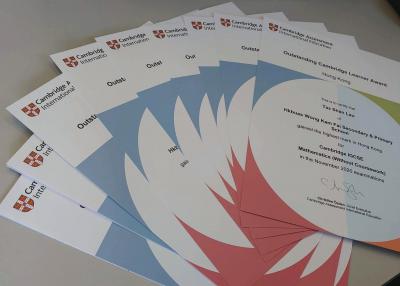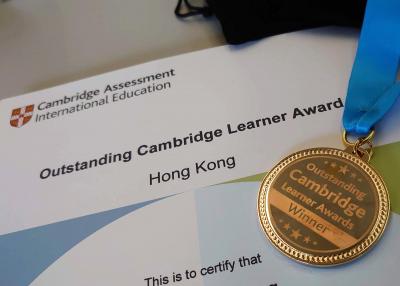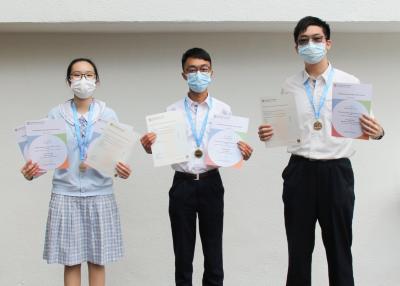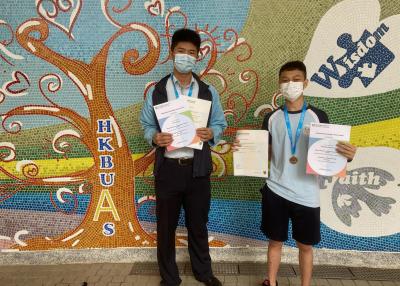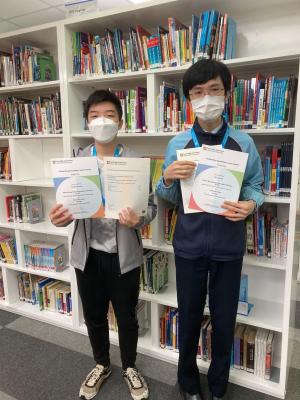Outstanding Cambridge Learner Award
Congratulations to our winners of the Outstanding Cambridge Learner Awards!
The awards are presented by the Cambridge Assessment International Education, in recognition of the exceptional achievement of learners in over 40 countries around the world, who took part in the November 2020 Cambridge IGCSE and International AS Level exam series. This time, we’ve got 7 students from the GCE A-level stream receiving the recognition:
KEUNG Tsz Shing
The High Achievement Award in Hong Kong for Cambridge IGCSE Biology
LAM Chak Ming Sherman
The High Achievement Award in Hong Kong for Cambridge International AS Level Economics
LAU Tsz Shan
The Highest Mark in Hong Kong for Cambridge IGCSE Mathematics
The High Achievement Award in Hong Kong for Cambridge IGCSE Business Studies
The High Achievement Award in Hong Kong for Cambridge IGCSE Economics
LEUNG Ching Wei
The High Achievement Award in Hong Kong for Cambridge IGCSE Accounting
LEUNG Shing Fung Seth
The Highest Mark in Hong Kong for Cambridge IGCSE Mathematics
WU Chung Yuen
The High Achievement Award in Hong Kong for Cambridge International AS Level Accounting
YAU Yik Hang
The High Achievement Award in Hong Kong for Cambridge IGCSE Physics
We have also invited some of them to share their learning experiences:
“However much I would like to say practice makes perfect, learning and studying are so much more than that. Getting this award furthered my appreciation for the thought process of the examiners, making learning much more fun. That is why exams, no matter how straining and frustrating they are, can be enjoyable if you know what to look for; hidden beneath every question is the human side of exams, not grades or distribution curves. While I don't fully possess these skills, the guidance from my teachers certainly helped me realise its importance.” - YAU Yik Hang
“Long study hours do not guarantee a good grade, hence I studied as efficient as possible by making a 2-month study plan. However, besides planning the time period for revision, allowing some flexibility in the timetable is also significant. It can avert you from being overwhelmed with all the studies and losing your efficiency. When I was in good condition, I extended the study period, and vice versa.
Furthermore, rather than spending time on my subject notes, I did a lot of past papers. This has helped me memorize the content efficiently and trained my writing speed. In addition to past papers, I spent time reading marking schemes. Thus, I understood how the marks were given and developed a structure for my answers.” - LAU Tsz Shan
“Chance favours the balanced and prepared mind. As such, I study with an on-off schedule, with each "cycle" lasting roughly an hour, for a total of 2-4 cycles. Here is how I divide the hour: For the first (roughly) 40-50 minutes, I will revise on a particular subject, rewrite my notes onto a big notebook, and organise them by chapter. For the remaining 10 minutes, I will relax for a little while: have a cup of water to clear the clutter built up in my mind, take a quick nap, or a good stretch of my arms and body. The number of times I repeat this cycle will depend on how much progress I make during these 40-minute sessions.
However, on the penultimate day leading to the examination, after completing additional revision in the morning for future examinations, I will take the rest of the day off to relax and prepare myself. I will also take a quick look at my finished notes at night, right before I sleep, and go to bed earlier than usual.” - KEUNG Tsz Shing
It is great to see that their hard work paid off! Keep pursuing goals with faith and determination, and success will follow!
